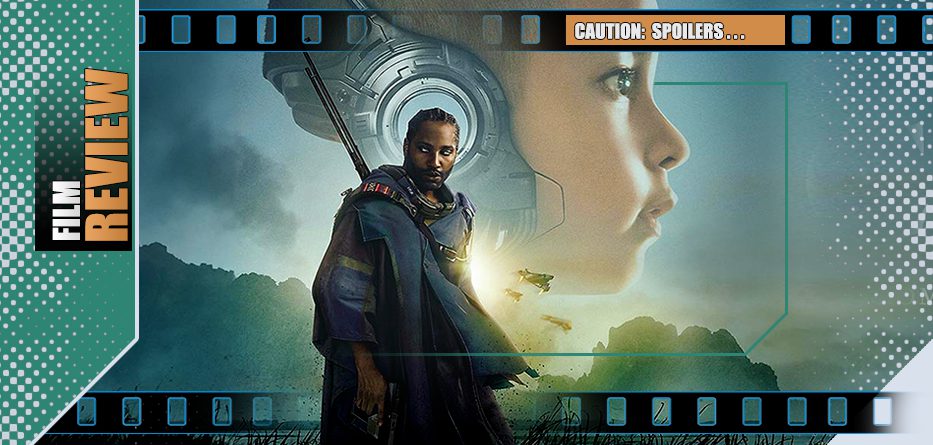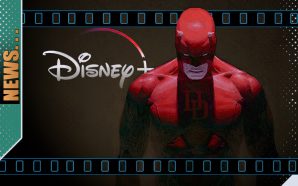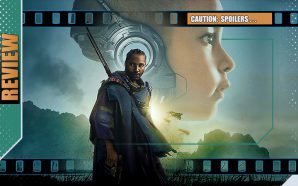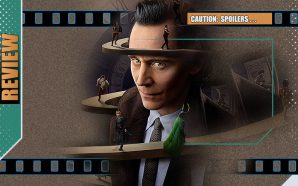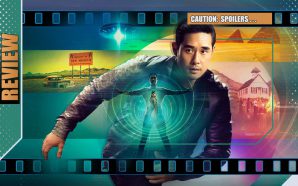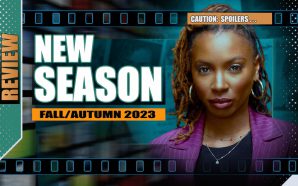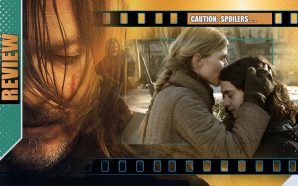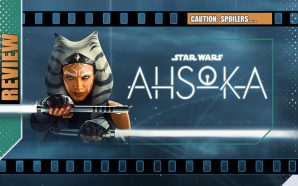In a world where AI-technology made a significant impact on society, but came into a cultural clash with humanity, it’s both perilous to be a human or a robot. In the West, AI is outlawed, in the East they are given sanctuary, but the battle-lines are often far from clear and the stakes seem to be getting higher.
Using the mighty NOMAD flying fortress, western humans are seeking out AI enclaves and unleashing devastating force and also seeking out both a legendary robotics creator known as ‘Nirmata ‘ and their latest weapon. The Powers That be insist that an operative Joshua be included in the latest mission, something he has no interest in being part of after an earlier tragedy that compromised his loyalty.
But when this latest mission goes awry, Joshua finds that the much-sought weapon is something very different than he could ever imagined and now he finds himself – and his new charge – being sought out by both sides as a potentially terrible endgame begins…
*spoilers*
There’s a good proportion of The Creator in which you’ll be blown away by the subversive way in which the feature film (and make no mistake, this is a feature film in the true sense of the term and one that needs to be seen on the big-screen) successfully indulges in both character-building and world building. In that initial time-frame, it completely and utterly lives up to the hype and the revolutionary way in which modern cinema is evolving in ways to transport, delight and inform. It’s truly action cinema with a brain and heart.
And it’s not that the presentation offers a particularly original tale … it’s a story about a grizzled protector reluctantly escorting a saviour-child through dangerous territory and in that sense it’s not just unoriginal it’s entirely the cultural meme of the moment – with other high-profile examples ranging from The Last of Us, Daryl Dixon, The Mandalorian – and those are just the last few years. Nor are the references and beats in and of themselves, new. It doesn’t take close inspection to see many of the influences and homages – this is essentially Apocalypse Now with machine-code, Avatar without the H20, Blade Runner on a global scale, Dances with Wolves with a circuit-board, I, Robot with better exoskeletons and District 9 gone ballistic… all put in blender and delivered unto audiences by Rogue One‘s Gareth Edwards (and, yes, there are similarities to that outing as well). But these are powerful ingredients to begin with and which The Creator aspires to rise to… and it succeeds in part, if by varying degrees.
The secret, at least for the first half of the film is that wholesale commitment to world-building. This isn’t a film that takes you out to the clean-cut, antiseptic stars, but instead brings you crashing into its all-too-Earthbound story. It’s about people… and robots that might be people too. Buy into the alt-history of the way AI-tech became part of the social landscape (decades earlier and wider than in our world) and then went wrong (presented quickly in pre-credits exposition and faux news-reels) and you’ll be invested.
There’s a lot to like here and there’s more dark, earthy empathy, technological marvels and social questioning in a teardrop of The Creator than there is in the whole sea of the water-logged Avatar 2. It’s a rich tapestry, destined to feature on many people’s lists for the year’s highlights, yet likely shut out of anything but technical Oscars. It’s definitely worth seeing, as much for its sheer ambition potential impact on the industry’s story-telling benchmarks rather than its adequate story…
Casting-wise, it’s top-notch. John David Washington has the quiet charisma that enables him – like his father – to handle intensely quiet or loud scenes with aplomb. Madeleine Yuna Voyles is good as the young ‘Alphie’ that Joshua needs to find, then protect, and perhaps the most enigmatic in the first half of the film where you don’t yet have a sense of what she may be capable of. Gemma Chan is enigmatic and Allison Janney relishes playing a bad guy for once. The international cast also chalks up Ken Watanabe, Sturgill Simpson, , Marc Menchaca, all on fine form.
The Creator depicts a world where the robotic workers were taken for granted and then apparently rose up, using their access to defense networks to detonate a nuclear bomb in Los Angeles and making America and the western world turn against AI while eastern territories (‘New Asia’) gave them sanctuary, amid claims that the disaster was never an actual attack. There are plenty of analogies about immigrants, refugees, flashpoint terrorism and expedient politics managing to ride the tide of fear. Even with those genre touchstones, there was a real chance this could be an all-time classic, just as the marketing promised and it’s really only the latter third of the film that lets that rating slip, still giving us a solid, impressive tentpole but not a truly timeless epic.
Director Gareth Edwards has found his niche – ordinary people in extraordinary situations, personal and sacrificial tales played out against epic backdrops -and it’s hard not to draw some parallels between all of his work to date on that level. However it’s worth remembering that Gareth Edwards left Rogue One, only for the film to be finished by Tony Gilroy and here we get a glimpse at the more battlefield-version that might have been. The film asks early questions about what constitutes ‘life’ and sways us one way then another as revelations occur about loyalties. But the subtlety in which the moral questions are raised and addressed on both sides tend to fade away as the film progresses and then it decides that the humans are clearly the oppressors and the AI nations are the oppressed with only a few shades of grey in between. It means that earlier valid questions are put aside in favour of large-scale set-pieces and more black and white moral action. No-one here is perfect, but some are clearly more equal than others. Once again, the human/western military devolve from legitimately flawed and reactive individuals to largely heartless thugs (admittedly driven by tragedy and knee-jerk politique). The robots and cyborg are now almost all valiantly fighting merely for their right to exist and even the ‘weapon’ at the heart of the piece is revealed to have been initially designed not to kill the humans but win the war and then return everything to a more diplomatic status quo. It’s all well and good to watch Johnny-Five reincarnated as a Buddhist monk and a junkyard version of Star Wars‘ Chopper being (almost) talked out of a suicide run, but the ever starker moral definition between human and robot demands that we, like the film, choose a side and it dilutes the dilemma and simplifies the film’s internal debate…
Yes, there are also several logic flaws along the way. If ‘Alphie’ is such a secret, it’s amazing how fast the pursuing forces get out accurate ‘wanted posters’ for Joshua and the child. Equally Allison Janney (let’s be honest, great in absolutely everything she does) spends half the movie saying the child should be executed on sight to stop any chance of taking down NOMAD and the minute she gets the opportunity to follow through, the film’s plot demands she hesitates for no real reason. Eventually spectacle – and it is spectacular – wins the day and we’re left with a frantic but uneven momentum and an ending (that I won’t spoil), which feels very much like it’s bending to a committee of voices rather than one singular and more distinctive conclusion.
Though ultimately flawed, there’s a lot to like here and there’s more dark, earthy empathy, technological marvels and social questioning in a teardrop of The Creator than there is in the whole sea of the water-logged Avatar 2. It’s a rich tapestry, destined to feature on many people’s list of the year’s highlights, yet likely shut out of anything but technical Oscars. It’s definitely worth seeing, as much for its sheer ambition potential impact on the industry’s story-telling benchmarks rather than its adequate story… but do see it on the biggest screen possible.
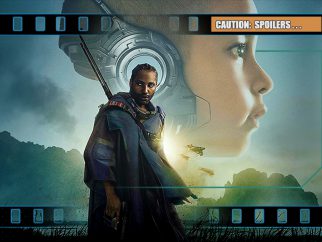
- Story8
- Acting9
- Directing9
- Production Design / VFX10

